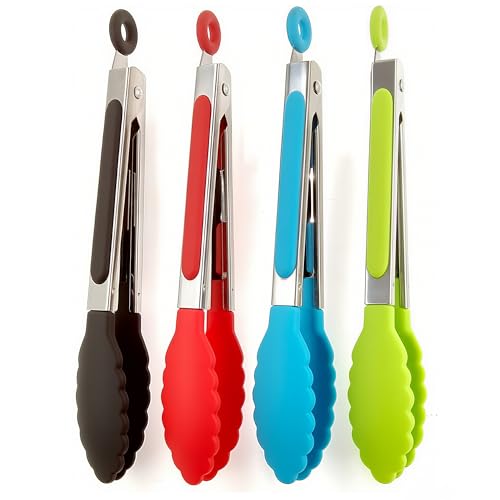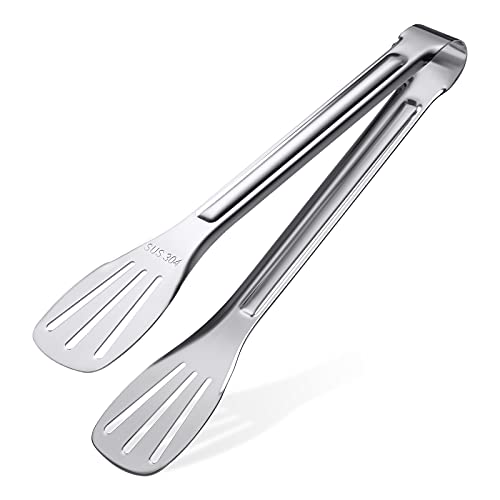What are tongs?
Tongs are a kitchen tool that is commonly used for gripping and lifting hot objects, such as pots and pans, without the need for direct contact with the hands. They are typically made of metal and have two long arms that are connected at one end and can be squeezed together to grip objects. Tongs are a versatile tool that is used in a variety of cooking and serving tasks, making them a staple in many kitchens.
Types of tongs
There are various types of tongs available on the market, each designed to serve a specific purpose in the kitchen. Some common types of tongs include:
- Kitchen tongs: These are the most common type of tongs and are used for a wide range of tasks, such as flipping food on a grill, tossing salads, and serving pasta. They often have a spring mechanism that allows for easy opening and closing.
- Barbecue tongs: These tongs are designed specifically for use on the grill. They are usually longer than kitchen tongs and have a scalloped or serrated edge for a better grip on meat or vegetables.
- Serving tongs: These tongs are used for serving food, such as salad, fruit, or bread, at the table. They are typically shorter and have a more elegant design compared to kitchen tongs.
- Ice tongs: As the name suggests, these tongs are used for picking up ice cubes. They are often serrated or have small teeth to grip the ice securely.
- Pasta tongs: These tongs have a fork-like design and are specifically used for serving pasta. They typically have long prongs that allow for a secure grip on the pasta.
Are tongs heat resistant?
Most tongs are heat resistant to some extent, but the level of heat resistance can vary depending on the material they are made from. Tongs that are specifically designed for use in high-heat environments, such as on a grill or in a frying pan, are typically made from heat-resistant materials like stainless steel or silicone.
Stainless steel tongs are known for their durability and heat resistance. They can handle high temperatures without warping or melting, making them suitable for use in hot pans or on a grill. Stainless steel tongs with silicone tips offer even better heat resistance and improved grip, making them ideal for handling hot food or flipping meat on a grill.
Silicone tongs, on the other hand, are not as heat resistant as stainless steel tongs. While they can withstand temperatures up to a certain point, they may melt or become damaged if exposed to extremely high heat. Therefore, it is important to check the heat resistance specifications of silicone tongs before using them in high-heat situations.
It is worth noting that the heat resistance of tongs can also be influenced by their design. Tongs with shorter arms or thinner materials may not be as heat resistant as those with longer arms or thicker materials. Therefore, it is wise to choose tongs that are specifically designed for the task at hand and can handle the expected temperature levels.
Using tongs safely
While tongs can provide a safe and convenient way to handle hot objects, it is important to use them correctly to avoid accidents or injuries. Here are some tips for using tongs safely:
- Always make sure that the tongs are intact and in good condition before using them. Check for loose or broken parts that could potentially lead to accidents.
- When using tongs to lift or move hot objects, grip them firmly but not too tightly. This will allow for better control and reduce the risk of dropping or spilling the hot item.
- Avoid placing the tongs directly on a hot surface or leaving them in a hot pan or grill for an extended period. This can cause the tongs to heat up and potentially burn you when you touch them.
- If using tongs with silicone or plastic parts, be mindful of the temperature limits specified by the manufacturer. Do not exceed these limits to avoid damaging the tongs or risking injury.
- After using tongs with metal parts, allow them to cool down before placing them in water or cleaning them. Rapid temperature changes can cause the metal to expand or contract, potentially damaging the tongs.
Caring for your tongs
To ensure that your tongs remain in good condition and continue to serve you well, it is important to care for them properly. Here are some tips for caring for your tongs:
- After each use, clean your tongs thoroughly with warm, soapy water and a sponge or cloth. Pay attention to any food residue or grease that may have accumulated on the tongs.
- For tongs with metal parts, dry them thoroughly after cleaning to prevent rusting or corrosion. Consider storing them in a dry place to further protect them.
- If your tongs have a spring mechanism, periodically check and lubricate it to ensure smooth operation.
- For tongs with silicone or plastic parts, avoid exposing them to direct heat or flame, as this can cause the material to melt or become deformed.
- If possible, store your tongs in a drawer or rack where they will be protected from dust, moisture, and other potential sources of damage.






